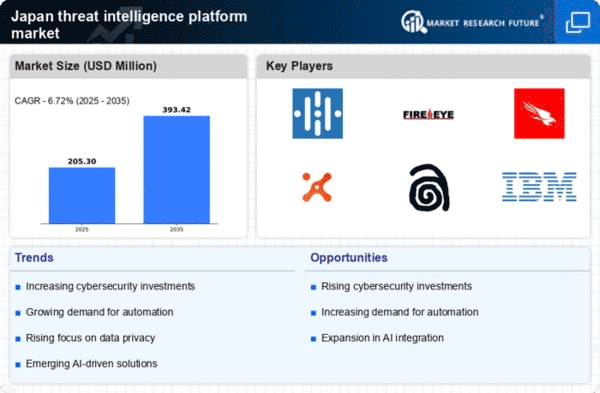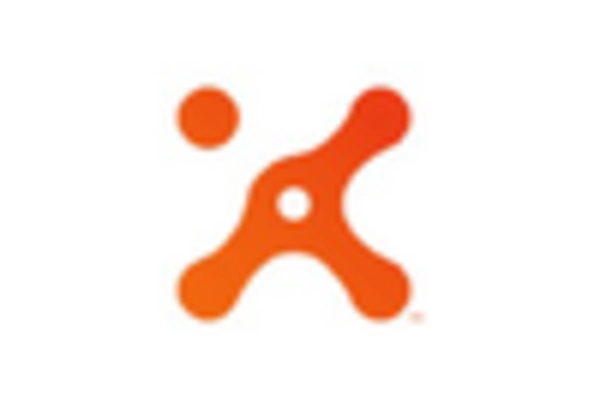Increasing Cyber Threats
The threat intelligence-platform market in Japan is experiencing growth due to the rising frequency and sophistication of cyber threats. Organizations are increasingly targeted by cybercriminals, leading to a heightened demand for advanced threat intelligence solutions. In 2025, it is estimated that cybercrime costs could reach $10 trillion globally, with Japan being a significant contributor to this figure. As businesses recognize the potential financial and reputational damage from cyber incidents, investment in threat intelligence platforms becomes a priority. This trend indicates a shift towards proactive cybersecurity measures, where organizations leverage threat intelligence to anticipate and mitigate risks. The need for real-time threat detection and response capabilities is driving the adoption of these platforms, making them essential tools in the cybersecurity arsenal of Japanese enterprises.
Digital Transformation Initiatives
The ongoing digital transformation across various sectors in Japan is significantly impacting the threat intelligence-platform market. As organizations adopt cloud computing, IoT, and other digital technologies, they expose themselves to new vulnerabilities. In 2025, it is projected that the digital economy in Japan will account for over 20% of the GDP, necessitating robust cybersecurity measures. Companies are increasingly recognizing that traditional security measures are insufficient in the face of evolving threats. Consequently, there is a growing reliance on threat intelligence platforms to provide insights into potential risks associated with digital initiatives. This shift towards a more integrated approach to cybersecurity is likely to drive innovation and investment in the threat intelligence-platform market, as organizations seek to safeguard their digital assets.
Regulatory Compliance Requirements
In Japan, stringent regulatory frameworks are shaping the threat intelligence-platform market. Organizations are compelled to comply with various data protection and cybersecurity regulations, such as the Act on the Protection of Personal Information (APPI). Non-compliance can result in hefty fines and reputational damage, prompting businesses to invest in threat intelligence solutions that ensure adherence to these regulations. The market is likely to see a surge in demand for platforms that offer compliance features, enabling organizations to monitor and manage their cybersecurity posture effectively. As regulatory scrutiny intensifies, the integration of threat intelligence into compliance strategies becomes crucial. This trend not only enhances security but also fosters trust among customers and stakeholders, further driving the growth of the threat intelligence-platform market in Japan.
Growing Demand for Incident Response Solutions
The threat intelligence-platform market in Japan is witnessing a surge in demand for incident response solutions. As cyber incidents become more prevalent, organizations are prioritizing the need for rapid response capabilities to minimize damage. In 2025, it is estimated that the incident response market will grow by over 15% annually, reflecting the urgency for effective threat management. Companies are increasingly adopting threat intelligence platforms that offer automated incident response features, enabling them to react swiftly to potential threats. This trend indicates a shift towards a more proactive cybersecurity posture, where organizations leverage real-time intelligence to inform their response strategies. The integration of threat intelligence into incident response plans is becoming a critical component of cybersecurity frameworks, further propelling the growth of the threat intelligence-platform market in Japan.
Investment in Cybersecurity Skills Development
The threat intelligence-platform market in Japan is also influenced by the growing emphasis on cybersecurity skills development. As the demand for skilled cybersecurity professionals continues to rise, organizations are investing in training programs to enhance their workforce's capabilities. In 2025, it is projected that the cybersecurity workforce gap will reach 3 million globally, with Japan facing its share of this challenge. Companies are increasingly recognizing that effective utilization of threat intelligence platforms requires skilled personnel who can analyze and interpret data effectively. This trend is likely to drive partnerships between educational institutions and businesses, fostering a new generation of cybersecurity experts. As organizations prioritize skills development, the threat intelligence-platform market is expected to benefit from a more knowledgeable workforce capable of leveraging these platforms to their full potential.
















